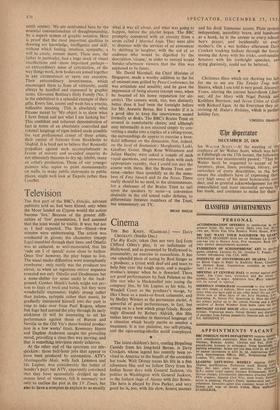Television
THE first part of ,the BBC's Othello, advance publicity told us, had been filmed; only when the Moor landed on Cyprus would the action become 'live.' Because of the greater diffi- culties of 'live' presentation, I had assumed that the joint would be visible. It was; but not as I had expected. The first—filmed—few minutes were embarrassing. The action was conducted in gloom; the characters (except lago) stumbled through their lines; and Othello was so cultured, so well-manicured, that his 'rude am I of speech' came close to bathos. Once 'live' however, the play began to live. The usual studio difficulties were triumphantly overborne: only rarely was the producer too clever, as when an ingenious mirror sequence revealed not only Othello and Dcsdemona but a scene-shifter (or some such) in the back- ground. Gordon Heath's hands might not per- tain to feats of broil and battle, but they were wonderfully expressive; highly strung rather than jealous, epileptic rather than manic, he gradually insinuated himself into the part in limp to take over from Paul Rogers, whose fine Iago had carried the play through its early stickiness (it will be interesting to set his performance against those of Burton and Neville in the Old Vic's three-backed produc- tion in a few weeks' time). Rosemary Harris and Daphne Anderson caught the prevailing, mood, providing a close that was moving; and that is something television rarely achieves.
At the other end of the spectrum are tele- quickies : those half-hour jobs that appear to have been produced by automation. ATV's Marriageable Male, with Jack Lemmon and Ida Lupino, was considerably the better of Sunday's pair; but ATV, apparently convinced that they have successfully dredged up the moron level of viewers, felt it necessary not only to outline the plot in the TV .Tines, but also to have a compere-to.explain to us exactly what it was all about, and what was going to happen, before the playlet began. The BBC promptly countered with an atrocity from a series called I Married Joan. They were able to dispense with the services of an announcer by • dubbing in laughter, with the aid of an audience who would be dignified by the description 'claque,' in order to remind torpid Sunday-afternoon viewers that the film was supposed to be funny.
Mr. David Marshall, the Chief Minister of Singapore, made a worthy addition to the list of eminent men grilled by Press Conference; he was articulate and sensible; and he gave the impression of being sincere (except once, when he boasted of his home reputation for sin- cerity). The camera work, too, was distinctly better than it had been the fortnight before for Mr. Aneurin Bevan. But I wonder if it is a good idea to keep the interviewers seated formally at desks. The BBC's Brains Trust sit around in comfortable chairs; and although easy informality is not attained simply by con- verting a studio into a replica of a sitting-room, the surroundings do appear to exercise a bene- ficial influence on the discussion. Not, indeed, on the level of discussion; Marghanita Laski, Geoffrey Gorer, Hugh Ross Williamson and Julian Huxley were asked a couple of such vapid questions, and answered them with such appropriate vapidity, that I could,not stay the course with them. But the Brains Trust con- verse—rather than speechify as do the mem- bers of Free Speech and In the News. There really should be no need, in the circumstances, for a chairman of the Brains Trust to call upon the speakers by name—a convention desirable in the old sound radio debates, to differentiate between members of the Trust, but unnecessary on TV.
BRIAN INOLIS


































 Previous page
Previous page